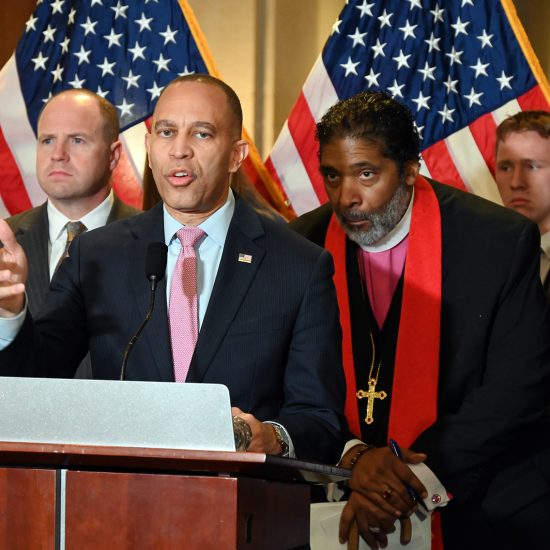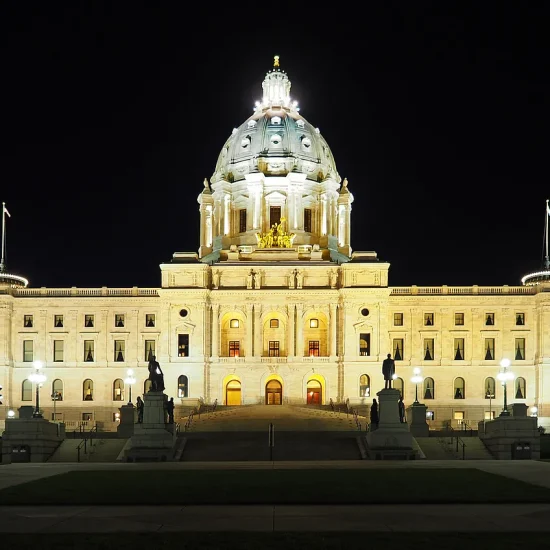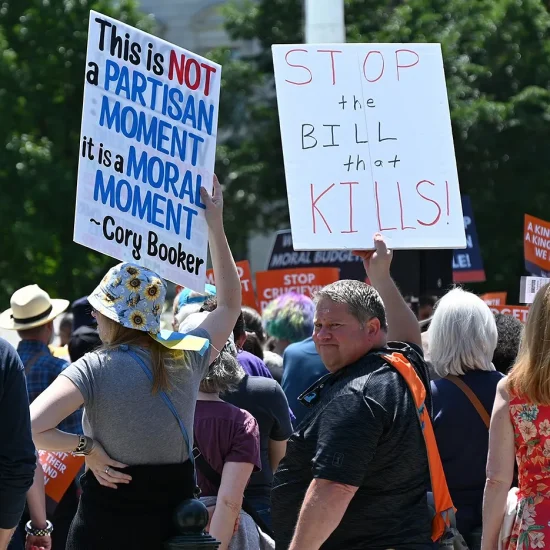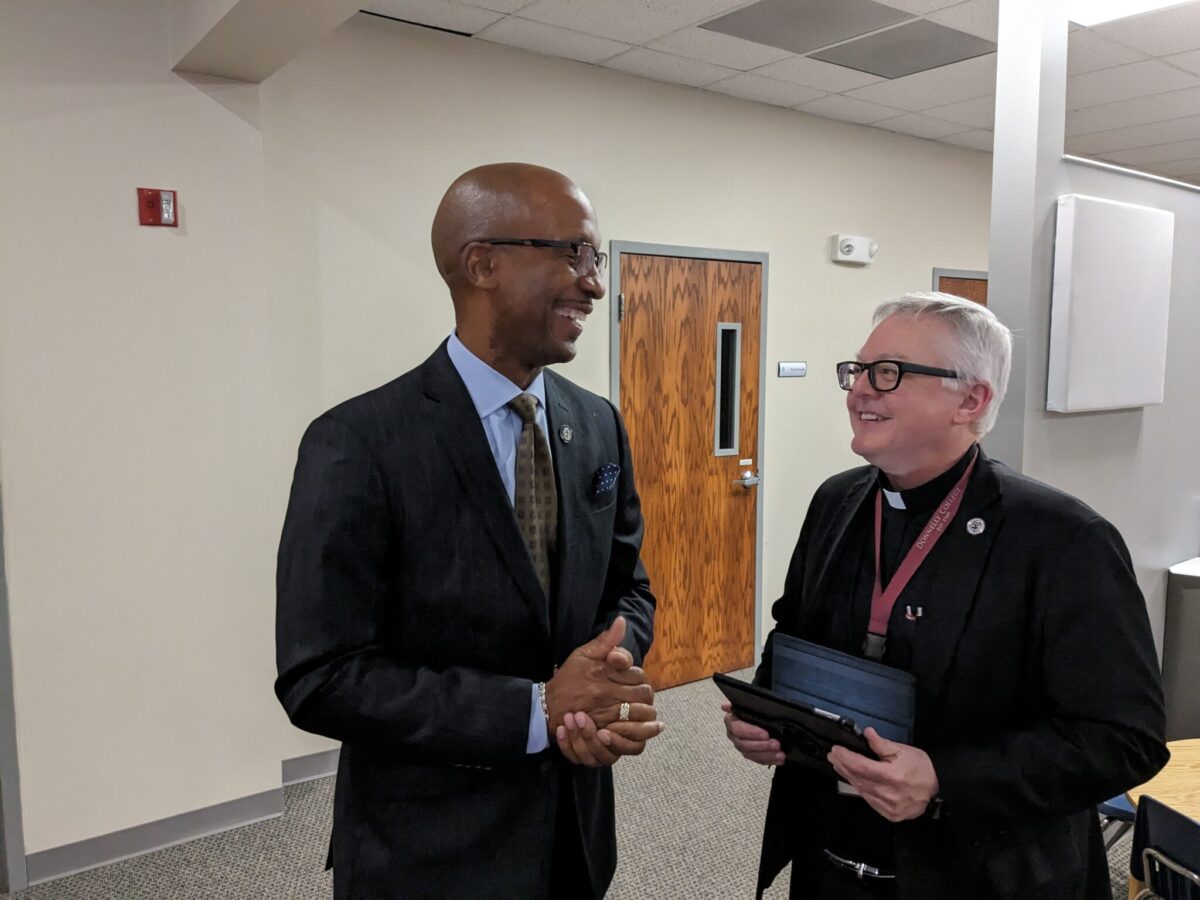
LENEXA — Monsignor Stuart Swetland wants conversation about right to life in Kansas to encompass the reality of people suffering from inadequate access to preventative health care and prematurely dying due to lack of treatment for serious ailments.
Swetland, president of Donnelly College in Kansas City, Kansas, and pastor of Our Lady and Saint Rose Catholic Church, said expanding eligibility for Medicaid to as many as 150,000 working poor in Kansas would be “the pro-life thing to do.” Expansion wouldn’t solve Kansas’ shortcomings in delivery of life-saving care to the needy, he said, but would be a step toward addressing moral truth.
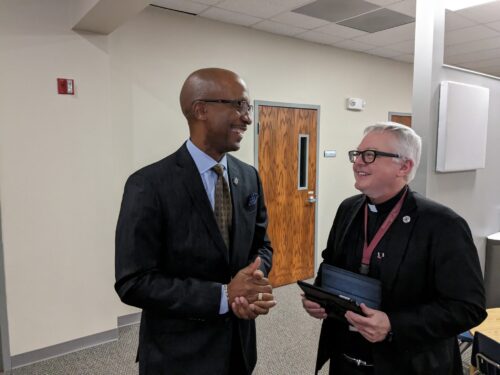
Rev. Bobby Love Sr., left, senior pastor of Second Baptist Church of Olathe, and Monsignor Stuart Swetland, president of the private Donnelly College in Kansas City, Kansas, and pastor of Our Lady and Saint Rose Catholic Church, urged the Kansas Legislature to deliver health care services to about 150,000 working poor in Kansas by expanding eligiblity for Medicaid. (Tim Carpenter/Kansas Reflector)
“Catholics believe that adequate health care is a right for everyone, not a privilege for the affluent,” said Swetland, a registered Republican. “As a Catholic theologian and priest, I support the expansion of Medicaid in Kansas to help thousands of my fellow citizens afford access to our health care system and to support our health care facilities in the less affluent areas of our state.”
He said many students and families associated with the private Catholic college would benefit from extending eligibility for Medicaid in Kansas. Only 10 states, including Kansas, continue to repel expansion. The four states surrounding Kansas embraced provisions of the Affordable Care Act aimed at serving people earning too much to qualify for Medicaid and too little to afford private insurance.
Prominent leaders of the Catholic Church, including Archbishop Joseph Naumann of the Archdiocese of Kansas City, have engaged for years in political drama on Medicaid reform by linking expansion legislation to restrictions on abortion rights. In the past, Naumann said Catholic bishops tempered support for Medicaid expansion due to concern the program would create “a funding stream for abortion.”
Swetland was among a diverse group of Kansas pastors and religious leaders participating in a forum at St. Paul’s United Methodist Church to discuss Democratic Gov. Laura Kelly’s campaign to convince the 2024 Legislature to end its embargo on Medicaid reform. The meeting was part of a series drawing attention to Kelly’s plea for Kansans to directly lobby their legislators on behalf of expansion.
The Legislature passed a Medicaid bill in 2017, but it was vetoed by GOP Gov. Sam Brownback. If Kansas had been among early adopters, Kelly said the state would have received about $7 billion by now in federal funding for Medicaid services.
The Alliance for a Healthy Kansas estimated 15,700 uninsured residents of Johnson, Leavenworth, Miami, and Wyandotte counties would qualify for Medicaid coverage if the Republican-led Legislature approved an expansion bill in 2024. Adoption would create 5,200 health care jobs in the four counties and trigger $135 million annually in new health care spending in that region.
“Clearly, there is no good moral or economic reason not to expand Medicaid,” the governor said. “It is strictly political and ideological.”
‘Vulnerable in our midst’
Pastor Kyle Reynolds, of St. Paul’s United Methodist Church, said he couldn’t sit quietly while members of his congregation, the city, and state remained beyond the reach of essential health care.
He said too many billions of dollars had been turned away because politicians in Kansas were content to deny people reasonable access to Medicaid. He said lawmakers responsible for blocking medical care were guilty of providing “terrible stewardship” of available resources.
“The Scriptures repeatedly call us to care for the most vulnerable in our midst, but Kansas is currently falling short of that benchmark,” he said. “Expanding access to Medicaid is a tangible way to love our neighbors, to care for the most vulnerable among us, and to be good stewards of the resources that we have — all of which are scriptural imperatives.”
Reynolds said faith communities struggled to triage basic needs of people in terms of food, shelter, clothing, and health care. The Legislature could relieve part of this obligation assumed by churches by expanding Medicaid, he said.
Rev. Bobby Love Sr., senior pastor of Second Baptist Church of Olathe, compared actions of legislators who turned their back on the poor without health insurance to people who passed on the other side of the road instead of aiding a man beaten, robbed, and left for dead on the route from Jerusalem to Jericho.
He said the parable of the good samaritan, who bound the man’s wounds and paid to have him cared for at an inn, illustrated the moral imperative of expanding Medicaid in Kansas.
“I’m just going to sum it up this way from a political perspective,” Love said. “That Senate could have helped, but they walked by on the other side. The Kansas House has done the same thing.”
Who is benefiting?
Scott Brewer, director of administration of Great Plains United Methodist Conference in Topeka, said access to health care was a point of emphasis for hundreds of Methodist congregations across Kansas.
“Frankly, I hear from our own pastors, with a great deal of embarrassment, talk about their own struggles to obtain health care,” Brewer said. “This is a heart-wrenching situation when folks who have committed their lives to service, whether that be in religious life or in service of their communities, because of the wage that they make and the nature of the benefits they are provided cannot provide health care for their own families.”
He said closure of health care facilities in Kansas should elevate debate about Medicaid expansion at the Capitol, but certain political forces were devoted to restraining that conversation.
“The question I just have to raise is: Who is benefiting from our decision to not act? Who is benefiting?” he said.
Rev. Roger Nishioka, senior pastor of Village Presbyterian Church in Prairie Village, said Medicaid expansion could be viewed from the perspective of Matthew 25.
In Scripture, he said, people who fed the hungry, gave fluids to the thirsty, accepted the stranger, clothed the naked, delivered health care to the sick, and visited the incarerated would be rewarded.
“It is the right thing to do because it is just. It is moral,” Nishioka said. “The Hebrew prophet tells us that justice falls down like waters and rightousness like an ever-flowing stream. Part of our language has to be the bringing together of justice and righteousness.”
Opposition: ‘Deeply immoral’
On Ash Wednesday in February, Sister Therese Bangert was among Sisters of Charity of Leavenworth who traveled to Topeka for delivery of a letter signed by more than 200 sisters and lay associates who endorsed Medicaid expansion. The letter went to Senate President Ty Masterson, R-Andover, and House Speaker Dan Hawkins, R-Wichita, who control the debate calendar in their respective legislative chambers. Both Statehouse leaders have consistently argued against expansion.
The visitors didn’t mince words: “As persons who have dedicated ourselves to living the gospel, we believe it is deeply immoral for more than 150,000 Kansans to continue to go without medical care.”
The women said there were significant economic and racial justice issues associated with Medicaid expansion. The 2023 legislative session ended without adoption of an expansion bill.
Bangert, social justice coordinator for the Sisters of Charity of Leavenworth, said the sisters built the state’s first private hospitals and offered care to patients regardless of whether they had money. She said some rhetoric relied upon by influential legislative opponents of Medicaid expansion was hurtful.
“The good samaritans have to be the Kansas taxpayers and the Kansas voters,” she said. “We have to be the good samaritans, picking people up and saying to those legislators, ‘We want this.’”
Kansas Reflector is part of States Newsroom, a network of news bureaus supported by grants and a coalition of donors as a 501c(3) public charity. Kansas Reflector maintains editorial independence. Contact Editor Sherman Smith for questions: info@kansasreflector.com. Follow Kansas Reflector on Facebook and Twitter.



